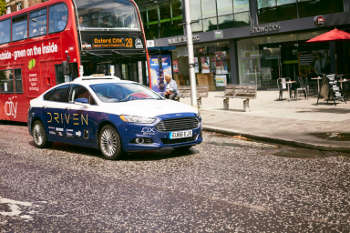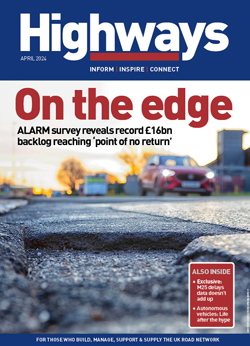The first stage of a major consultation by the Law Commissions of England and Scotland into the legal ramifications of driverless cars has provoked heated debate and looks set to raise more questions than it answered.
Key issues include whether driverless cars could mount kerbs, exceed speed limits or 'edge' through pedestrians.

Experts across the industry responded to the survey and the document Automated Vehicles: Analysis of Responses to the Preliminary Consultation Paper, is now available online.
'We raised three “sample questions” about whether automated vehicles should ever mount the pavement, exceed the speed limit or “edge through” pedestrians. Our aim was to use these examples to address broader questions about when automated vehicles should be allowed (or required) to depart from road rules. All three issues proved controversial,' the document states.
Mounting the pavement:
'A small majority (56%) thought that this would be acceptable in order to allow emergency vehicles to pass, while 52% thought it would be acceptable in order to avoid an accident. However, many arguments were put that mounting the pavement at speed should never be permitted.'
Exceeding speed limits:
Ths issue also split views. Out of 123 respondents to this question around 60 thought that automated vehicles should never speed, 'with academics and safety groups putting robust arguments for this point of view'.
The Parliamentary Advisory Council for Transport Safety (PACTS) said automated driving systems (ADS) 'should not be permitted to exceed the speed limit, “within current accepted tolerances” [10% +2mph], except to allow for minor, short-term variations in gradient' and made a systematic and convincing argument against allowing it.
PACTS said: 'One of the most commonly cited reasons to justify ADS being permitted to exceed the speed limit is the potential need to ‘overtake a vehicle as quickly as possible to avoid collision’ or to ‘speed out of danger’. We do not accept this premise. The ADS should be programmed to avoid such situations.'
Professor Phil Goodwin also dismissed the 'folk myth' that 'exceeding the speed limit while overtaking can be a contribution to safety'.
A separate, contributory survey of RAC members in January this year found that out of 2,201 respondents:
- Two-thirds (68%) of motorists support the idea of allowing autonomous vehicles to exceed the speed limit if it helped maintain traffic flow. Only a third (32%) opposed this.
- More than two-thirds (75%) of motorists support the idea of allowing autonomous vehicles to exceed the speed limit to prevent overly sharp braking when reaching a lower speed limit. Only a quarter (25%) opposed this.
- A large majority (85%) of motorists support the idea of allowing autonomous vehicles to exceed the speed limit if it was done in the interests of safety (e.g. overtaking a vehicle quickly to avoid a collision). Only 15% opposed this.
The Law Commissions found: 'No respondents thought that automated vehicles should be allowed to travel markedly faster than the speed limit, at least not for now, on unsegregated roads. However, around half of respondents suggested that the rule should not be absolute. Instead, ADSs should be permitted to exceed the speed limit within current accepted tolerances, 160 in some limited cases and in appropriate conditions.'
Edging through pedestrians:
Of the 125 respondents to this question, around 60 'were strongly against the idea that automated vehicles should ever edge through the pedestrians'.
A minority (around 30) made arguments in favour of edging through pedestrians, although most said this should be limited to particular circumstances, or subject to particular safeguards.
Many respondents thought that an automated vehicle which needed to edge through pedestrians should hand back control to the user-in-charge. This view was put by, among others the Institute of Highway Engineers (IHE).
Some argued that the very idea was 'crazy' and others expressed doubt that 'any skilled programmer' could make it feasible.
Dr Charles Fox, who studies game theory in AV-pedestrian interactions, argued on the other side.
He said: Game theory shows that a vehicle (human or autonomous driven) MUST be capable of carrying out a "credible threat" to either hit or otherwise inflict some other negative utility onto pedestrians and other vehicles, in order to make any progress at all.
'If a vehicle is programmed to be completely safe then other road users will learn of this and then take advantage of it to take priority over it in every interaction, and the vehicle will make no progress. Actually, carrying out the credible threat -- as in nuclear warfare -- would be an extremely rare occurrence, but there must be some small probability of doing so formally programmed into the system.'
The issue of introducing a 'jaywalking' law was raised as a solution; however council directors' body ADEPT's Rights of Way Managers Working Group highlighted that, particularly in rural locations, “jaywalking” laws 'could have the effect of severing the Public Rights of Way (PROW) network'.
ADEPT further noted that 'the vast majority of rural carriageways do not have footways' and therefore pedestrians in these areas must be able to walk on the carriageway.
User in charge
The vast majority (79%) agreed with there should be a 'user-in-charge' in a position to operate the controls, unless the vehicle is specifically authorised as able to function safely without one.
However, this raises the prospect of handovers between machine and human, which the Law Commission 'are a matter of acute public concern'.
'Questions relating to handover are complex, and we will need to return to this subject. We appreciate consultees’ concerns that unplanned emergency handovers by “eyes off” users are inherently dangerous and should not be encouraged. We will take this concern seriously in formulating further proposals,' it said.
Two-thirds of consultees agreed that a user-in-charge of a highly automated vehicle should not be considered to be 'driving' while the ADS was engaged.
The Law Commission of England and Wales and the Scottish Law Commission are conducting a three-year review to prepare the legal framework for self-driving vehicles.
A final report with recommendations on all issues is due in 2021.



